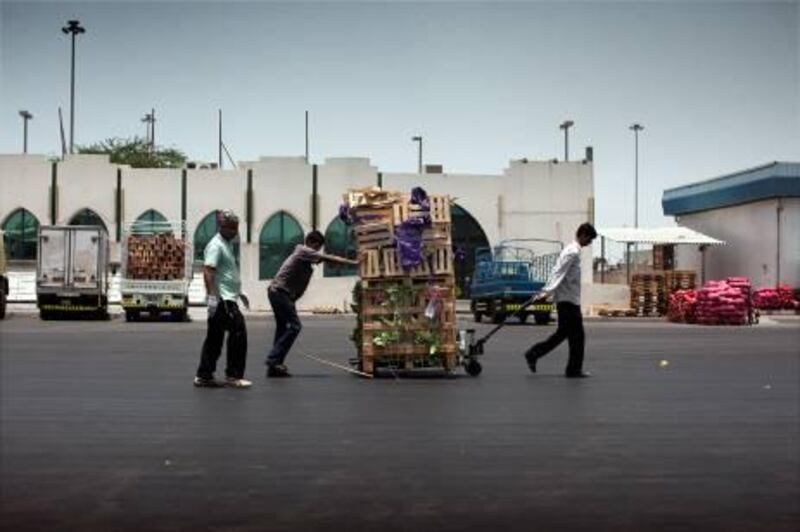ABU DHABI // Damaged and decaying pumpkins rest under a dirty mattress, next to a truckload of watermelons that are boiling in the scorching sun. Nearby, a filthy bedspread sits on top of a box of warm, spongy tomatoes.
Things are hardly better at the meat market next door, its fly-infested corridors full of dirt and unattended sandals. Many workers forgo headgear, mouth protection and gloves.
Uncovered cooked sheeps' feet sit inside shops - kept at about 20°C - on top of dry pieces of meat.
Chops of meat are transported on dirty metal trolleys, some in direct contact with the vehicles. A worker takes the chops to a larger fridge with a damaged, mouldy rubber sealing. Here, it is even hotter: 25°C.
The scenes at the Mina fruit and vegetable market and the adjacent meat market yesterday were enough to put Sven Mostegl, a food consultant, off his lunch.
"A watermelon cut open in the heat will spoil almost immediately and its taste will turn sour," he says. They are 92 per cent water, which will quickly evaporate in the heat.
Anywhere between 5°C and 65°C, say experts, is a danger zone in which bacterial contamination is inevitable. By law, vegetables must be stored below 5°C.
"It's now about 35 degrees," says Mr Mostegl - perfect for bacteria. Regulations in place for three years require food to be transported in closed, temperature-controlled trucks. There is scant sign of those, though.
"They came in containers by ship," insists Hamza A, a stallholder. "I only moved them to the open truck for display."
In Europe, vegetables such as potatoes are stored inside at 8°C to ensure a long shelf-life. Here, though, the vegetables "can only be used for a week or two, given their condition", says Mr Mostegl.
The Abu Dhabi Food Control Authority is clear about the regulations: no food should be stored in direct sunlight.
"They should be stored in appropriate conditions commensurate with the nature of the product to ensure their safety," says Mohamed Jalal al Reyaysa, the authority's communications director.
Meat should be kept covered, and under 5°C to stop bacteria multiplying. "In Europe, you can store the meat for 30 days but here, it will only last a couple of days," says Mr Mostegl.
By international standards - in place here, at least in theory - chopping blocks and meat knives must be red, to prevent them being used for poultry. But of Mina's 41 butchers, only a couple own a red knife.
"That means mixing different bacteria," says Mr Mostegl, "which can ultimately cause salmonella, E.coli or severe stomach problems. We don't just deal with food, we deal with life."
One of the butchers has left his door open - "a field for growing bacteria", according to the food consultant. Anything more than a couple of hours in danger zone temperatures risks contamination.
All shops own handwash, but not one has the legally required hand disinfectant.
Several have partly concrete walls, another breach of the rules. "You need ceramic walls - otherwise the surface is open to infections."
Nor are there cool-boxes or refrigerated corridors - another breach.
The watchdog says it is doing what it can. Although its last inspection campaign at the markets was in December, inspectors visit "on average two to four times a week", says Mr al Reyaysa. "They also conduct follow-up visits."
Back outside, though, a stallholder cuts open a potato. Inside, it is rotten and mouldy. Another picks up a festering tomato from the floor and throws it back into his box of wares.






